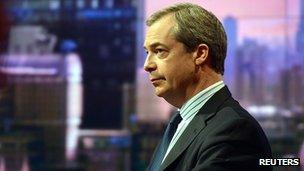Farage looks to Canada for inspiration
- Published
- comments

Mr Farage is aiming high
George Osborne is not the only one looking to Canada for salvation; Nigel Farage is too.
But while the chancellor has merely hired a Canadian financier to run the Bank of England, the leader of UKIP is seeking to emulate a political revolution that swept the country in the 1990s.
You may remember the Canadian Reform Party. They were the populist, right-of-centre, small state, low tax, anglophone party that came from nowhere in 1993 to win 52 seats in Canada's federal parliament.
Reform routed the Conservative Party - which was left with just two seats - and soon became the official opposition. For years the right in Canada were split and the Liberal Party flourished until eventually Reform and its successors merged with the Conservatives.
Last week the UKIP leader travelled to Ottawa to meet the founder of Reform, Preston Manning, to find out how he did it, how a small, insurgent, west coast party took on the political establishment in the east of Canada and won.
Mr Farage shared a platform with John Howard, the former Australian prime minister, before an audience of 1,000 people at a conference run by Mr Manning's political foundation.
This is what Mr Farage told me he had learned:
1. The by-election that Reform won in 1989 was crucial in convincing voters that a vote for them was not as wasted vote. Expect UKIP to throw everything at its next chance for a seat in Parliament.
2. Reform had, he says, a good slogan - "A common sense revolution" - that reflected Reform's anti-establishment, blue collar agenda. Expect a similar slogan from UKIP in this summer's local elections.
3. Reform had a foundation, an organisation that promoted its views and carried out research. "There is a big gap in UKIP's armoury and that is a foundation," Farage says. "Margaret Thatcher had the IEA. We need a UKIP-friendly think tank."
4. Reform's greatest influence came in changing the Conservative Party with which it ultimately merged, in what Mr Farage, as a former City man, describes as a "reverse takeover". No one can ever say that UKIP's leader lacks ambition; he is clearly aiming high and long. "Doing a deal with the Conservatives is not uppermost on our agenda," he says. "It is not something I would consider until after the next election." But the idea has clearly crossed his mind.
Key fact: Stephen Harper, the Conservative prime minister of Canada, was first elected to the Canadian parliament in 1993. As a young MP for the Reform party.
Now that really is food for thought...